
By Fayaad Islam
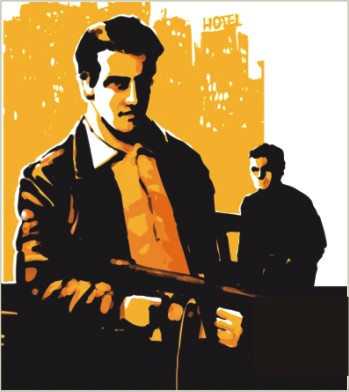 Lock, stock and two smoking barrels. This clearly has nothing to do with Guy Ritchie's brilliant film. It is simply what poor Thomas Angelo glimpsed in his last moments. That followed by the triggerman delivering one of the most epic dialogues of the game: “Mr. Salieri sends his regards”. Well, to be more precise Tommy wasn't able to witness the smoke coming out of the end of the sawn off double barrel shotgun that had the honour of imposing “Omerta” (the Sicilian mob's code of silence) on him. Like any normal person, he got blown off right after the click which was followed by the bang, thus ending one of the most legendary games in the history of mankind, Mafia: The City of Lost Heaven. Its later sequel manages to uphold some of the finer traditions in the game, as well as adds a couple of new moves and an equally undeniably awesomeness like that of its predecessor, and manages to take its self to the apex of gaming experiences; although those who rather enjoyed the more complete story of the original Mafia game would beg to differ.
Lock, stock and two smoking barrels. This clearly has nothing to do with Guy Ritchie's brilliant film. It is simply what poor Thomas Angelo glimpsed in his last moments. That followed by the triggerman delivering one of the most epic dialogues of the game: “Mr. Salieri sends his regards”. Well, to be more precise Tommy wasn't able to witness the smoke coming out of the end of the sawn off double barrel shotgun that had the honour of imposing “Omerta” (the Sicilian mob's code of silence) on him. Like any normal person, he got blown off right after the click which was followed by the bang, thus ending one of the most legendary games in the history of mankind, Mafia: The City of Lost Heaven. Its later sequel manages to uphold some of the finer traditions in the game, as well as adds a couple of new moves and an equally undeniably awesomeness like that of its predecessor, and manages to take its self to the apex of gaming experiences; although those who rather enjoyed the more complete story of the original Mafia game would beg to differ.
Although it's hard for the rest of the world to pronounce most of the names of these Eastern European developers, one thing we get, are their awesome products. Mafia 2 is yet another game produced by 2K Czech, a company renowned for not only creating the first of the Mafia series, but also the ever creative FPS series 'Vietcong'.
Whereas the first Mafia game took place in the city of Lost Heaven, Mafia 2 starts off in Empire City, and just like its counterpart Liberty City, Empire seems another virtual replica of the great city of New York, where most forms of organised gang operations and other criminally violent activities for the majority of free roaming games take place. The main character for this story is Vito Scaletta, who, like any other great Italian mobster happens to be a Sicilian immigrant arriving in the country with his parents and elder sister, who happens to have escaped from the grasps of poverty and Mussolini, only to arrive to a place which is almost the same for poor, foreign speaking refugees coming off a boat. Thus begins Vito's life in the USA as he befriends his greatest comrade, the infamous wise guy Joseph Barbaro, and gets involved in the many illegal activities of the Empire City crime families in an exciting, violent and compelling storyline.
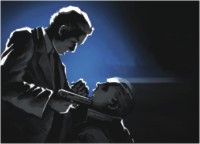 Although some of the Mafia hardliners debate on whether the story of the latter is actually as good as the first, a glance at the game play really shows the upgrades in motion. Driving around the city has never been so entertaining with the classic cars of the late 40s and 50s, along with the bustling nature of the city gives the player a unique experience. Pick locking, swapping number plates and a few other modified activities ensure that the player is completely mesmerised by the activities of roaming around freely. Finding a few rather 'unique' batch of collectibles (that cannot be mentioned in the paper) guarantees continuous attention by most gamers. But the sweet cherries of the sundae are the battles. Putting aside the awesome hand-to-hand combat interface that the game uses, gun battles of Mafia 2 are phenomenal. Combined with the proper sound and visual changes, a player can latterly feel the recoil of the gun as well as experience its dispatch shred through the virtual mobster in the distillery. The game also boasts a wider range of tools in the arsenal which includes a German made heavy machine gun, the MP 40, which is used in a selective mission, along with the Mafia's iconic weapon the Thompson 1918 Submachine gun or the more affectionately dubbed “Tommy Gun”.
Although some of the Mafia hardliners debate on whether the story of the latter is actually as good as the first, a glance at the game play really shows the upgrades in motion. Driving around the city has never been so entertaining with the classic cars of the late 40s and 50s, along with the bustling nature of the city gives the player a unique experience. Pick locking, swapping number plates and a few other modified activities ensure that the player is completely mesmerised by the activities of roaming around freely. Finding a few rather 'unique' batch of collectibles (that cannot be mentioned in the paper) guarantees continuous attention by most gamers. But the sweet cherries of the sundae are the battles. Putting aside the awesome hand-to-hand combat interface that the game uses, gun battles of Mafia 2 are phenomenal. Combined with the proper sound and visual changes, a player can latterly feel the recoil of the gun as well as experience its dispatch shred through the virtual mobster in the distillery. The game also boasts a wider range of tools in the arsenal which includes a German made heavy machine gun, the MP 40, which is used in a selective mission, along with the Mafia's iconic weapon the Thompson 1918 Submachine gun or the more affectionately dubbed “Tommy Gun”.
However, like most brilliantly constructed games, Mafia 2 also comes up with its own set of shortcomings. For one thing, the story is too short, and to avoid spoilers, doesn't end the way most expect. For a game that has been waited for, for such a long time with so many expectations attached due to its namesake, it seems unable to meet all the wishes of its hardcore fan base. Moreover, most people considered the second Mafia to be a complete open world free roaming game, which it happened not to be as the game kind of ends with the story, with no other mini-missions or activities to fill up in between the story either. It seems that 2K Czech stuck to the traditions of the first game when they might have been better off changing the last bit.
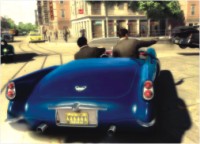 All in all the game got pretty good ratings in most respectable game review sites and magazines to it retaining most of the classic Mafia feel. The game also manages to put players into a feeling of nostalgia as some missions refer back to the City of Lost Heaven and even goes as far as to pay Mr. Angelo a visit. The Mafia 2 is a classic mob related action adventure game that no gamer should have the audacity to miss out on. If “The Godfather” was the epic movie that created the world of the Sicilian mobsters for movie watchers, unlike its namesake game (which failed to be anywhere close to the movies) Mafia and its successor Mafia 2 is the equivalent in the gaming community. Mafia is the game for all action loving computer enthusiasts and movie lovers alike. Besides, no one can ever deny the combinations of snazzy wise guy dialogues, three-piece suits with hats and overcoats, and a Tommy Gun to do the negotiations for the deal.
All in all the game got pretty good ratings in most respectable game review sites and magazines to it retaining most of the classic Mafia feel. The game also manages to put players into a feeling of nostalgia as some missions refer back to the City of Lost Heaven and even goes as far as to pay Mr. Angelo a visit. The Mafia 2 is a classic mob related action adventure game that no gamer should have the audacity to miss out on. If “The Godfather” was the epic movie that created the world of the Sicilian mobsters for movie watchers, unlike its namesake game (which failed to be anywhere close to the movies) Mafia and its successor Mafia 2 is the equivalent in the gaming community. Mafia is the game for all action loving computer enthusiasts and movie lovers alike. Besides, no one can ever deny the combinations of snazzy wise guy dialogues, three-piece suits with hats and overcoats, and a Tommy Gun to do the negotiations for the deal.
Anime Film Review
Perfect Blue and Millennium Actress
By Jawad
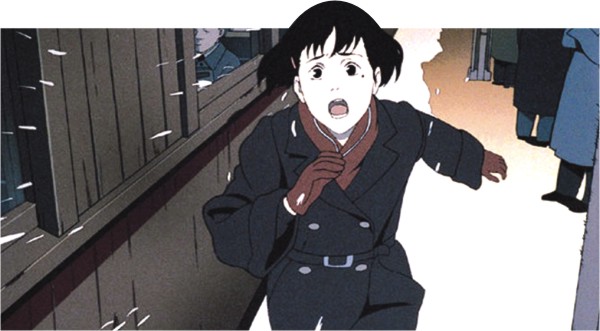
It is said that the most productive age, intellectually, for humans begin as they turn forty. Our very own literature genius Rabindranath Tagore rued his self-styled 'incompetence' over the first forty years of his life and wished to burn them all and rewrite as he had felt himself becoming mature with age. I can fearlessly say, most artists would consider their works more beautiful if they reek of the said maturity of their minds. If you consider 'anime' an art form, an expression of our thoughts, (which you should) you definitely have to agree, the world had yet to see the true brilliance of one Satoshi Kon, who has passed away at the age of 46 on August 24, 2010. Ask any devoted follower of anime and he will tell you that Kon is, and will be, one of the most outstanding names in anime film industry. His fantastic works in Perfect Blue (1998), Millenium Actress (2001), Tokyo Godfathers (2003) and Paprica (2006) mark his brilliance and devotion to the sector. It's a little late for an obituary, we apologise for that, but a tribute to his memory is a must, which we will try to do with a very short review of two of his works this week.
Perfect Blue:
It follows a singer-turned-actress Mima Kirigoe dealing with a stalker who can't accept her falling from grace as she suffers from an emotional breakdown that makes her unable to separate reality from fantasy. Serial murders, race to prove one's innocence and discovering the true culprit may be the deciding factor of the film, but the real focus was on the psychological status of the characters. Delving into the characters' own worlds has never been so colourful. Rated: 17+ for Bangladeshi audiences.
Millennium Actress:
A documentary filmmaker, Tachibana meets with an aged actress, Fujiwara Chiyoko and takes on a journey through the times and her illusive search for a phantom lover. The memories get hold of the narrative; we are taken to everything from samurai flicks to sci-fi noirs, through her eyes of course. The film goes into flashback after flashback and at one point the modern day Tachibana and Chiyoko, along with the cameraman find themselves interacting in those flashbacks. Darn confusing, I tell you. But this gimmick proves useful as at the end of the 87 minutes of the film you suddenly 'get everything' without needing anyone to tell you, if you have managed rapt attention throughout. It was really an awesome work on the director's part. Romance is low key, even though it is a romantic anime. The emotional intensity and mature theme of the film make it suitable for older teens.
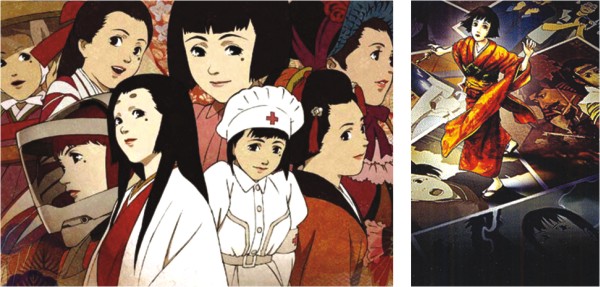
Availability: Aside from the usual fan-subs on the Internet, the films are available on DVD in some reputed anime markets (most notably Rifles' Square).
Styles and attractions:
Non-linear story telling can be a masterful art form in the hands of an expert, as proved by Christopher Nolan. Satoshi Kon, in this regard, can be very easily called a genius. His trademark is his mixing of reality and dreams, fantasy and the present. We switch between eras, go through a whirlwind of colours, feel emotions in abound. The line between the dream world and the real never completely fades, rather hangs around as a blur. With cool soundtracks and entertaining animation, Satoshi's films are certain to keep a group of people engaged. With dazzling story telling technique and mature subject matter, Satoshi felled the root of the idea that anime is for kids’ entertainment only. The films will feel confusing, one has to admit, but even so it promises a good memory. His talents will surely be missed, that's for sure.
Rest in peace, Satoshi Kon.
Sources: ANN, Midnight Eye, Wikipedia
Must Watch TV:
IT Crowd
By Orin
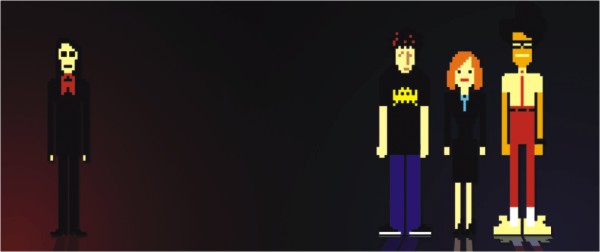
I’M afraid to say that there are a lot of people among us who say that they don't 'like' or 'get' British humour. Now it's okay to have your opinions and whatnot, but if you somehow fall into the category of not even watching any British shows just because you 'think' they are not your type, you're just being discriminatory, and we all know that discrimination is bad, right? The networks have their good days and bad ones, and sometimes they come up with something utterly mind blowing. Well, IT Crowd might not be exactly like that, but it comes pretty close to being a superb sitcom.
Office comedy was in vogue a few years back, with The Office and 30 ROCK leading the way, now it also seems like geeks are fashionable too, with shows having taglines like 'Smart is the new sexy'. IT Crowd has the rare good combination of both those things but somehow it manages to stay hidden.
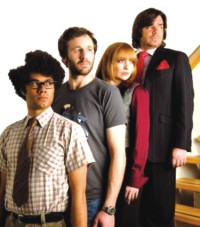 The story: Jen (Katherine Parkinson), who is a computer noob who puts email and the Internet as her IT skills in her CV, somehow manages to get a job as the head of IT (which is basically a basement room, with 2 employees) in Reynholm Industries. One of her main responsibilities is to baby-sit the two IT employees; one a socially awkward genius (Moss) who prefers to speak robotically, and another, a hopeless romantic, (Roy) who maintains very low hygiene. At Reynholm Industries, the bosses are crazy, the women are desperate and the geeks, well, they don't get out much.
The story: Jen (Katherine Parkinson), who is a computer noob who puts email and the Internet as her IT skills in her CV, somehow manages to get a job as the head of IT (which is basically a basement room, with 2 employees) in Reynholm Industries. One of her main responsibilities is to baby-sit the two IT employees; one a socially awkward genius (Moss) who prefers to speak robotically, and another, a hopeless romantic, (Roy) who maintains very low hygiene. At Reynholm Industries, the bosses are crazy, the women are desperate and the geeks, well, they don't get out much.
There is Roy's classic catchphrase, “Have you tried turning it on and off again?” Then there are those crazy episodes like the one where they learn to talk like 'normal men' and end up robbing a bank, the one with 'friendface' (it's a disease!) and one with Moss's Spelling fight club. This is when they really stop being another sitcom about geeky guys and start becoming something way superior.
What I just said was a complete cliché, right? Yes, it actually is. Everything in the show from the story about a computer illiterate boss to the goth guy who hides himself in the basement shouts cliché and the clichés are what makes it so amazingly hilarious. It kind of wraps up all those clichés and stereotypes and clicks the send button.
And now comes the question, Should you watch it?
Heck yeah!
There are no explanations for not watching something like this. There just ain't. Time wise, the four seasons altogether will cost you as much time as a season of The Big Bang theory. If you still don't like it, you probably should stop watching television shows
altogether.
Source: http://www.nytimes.com
